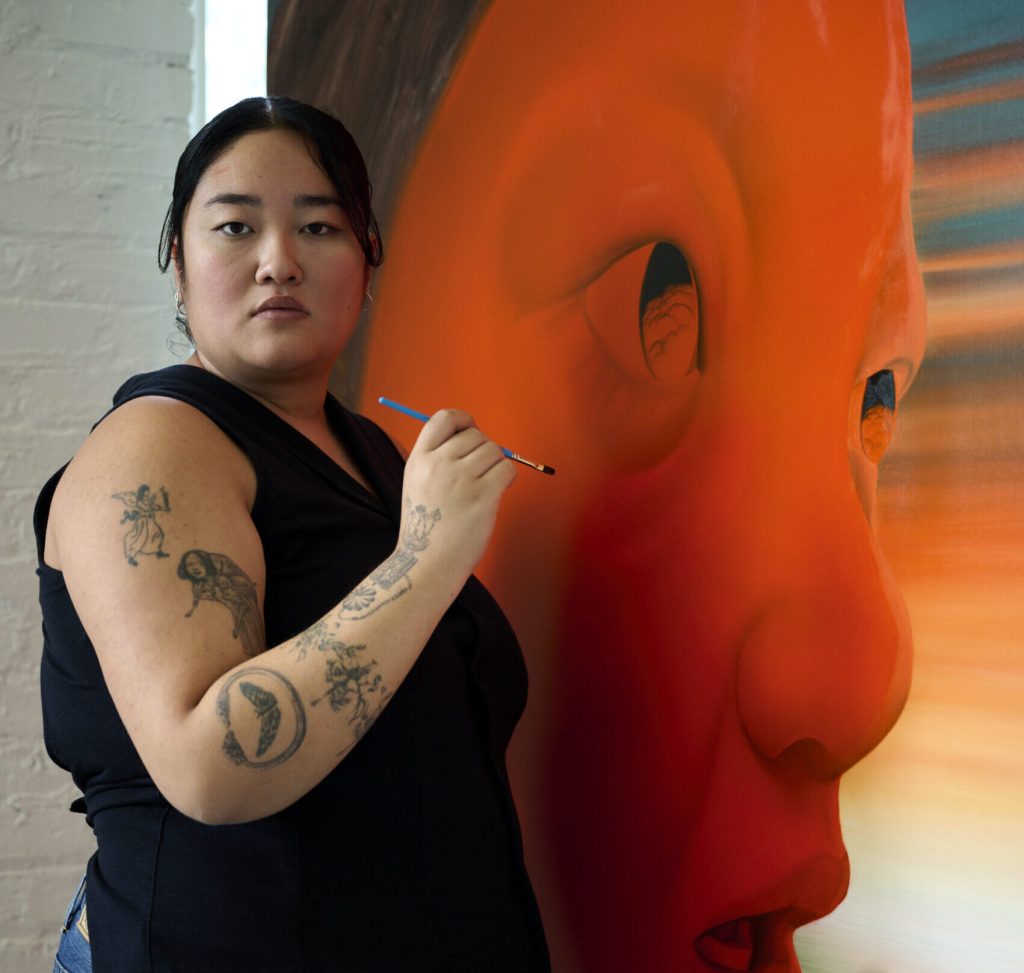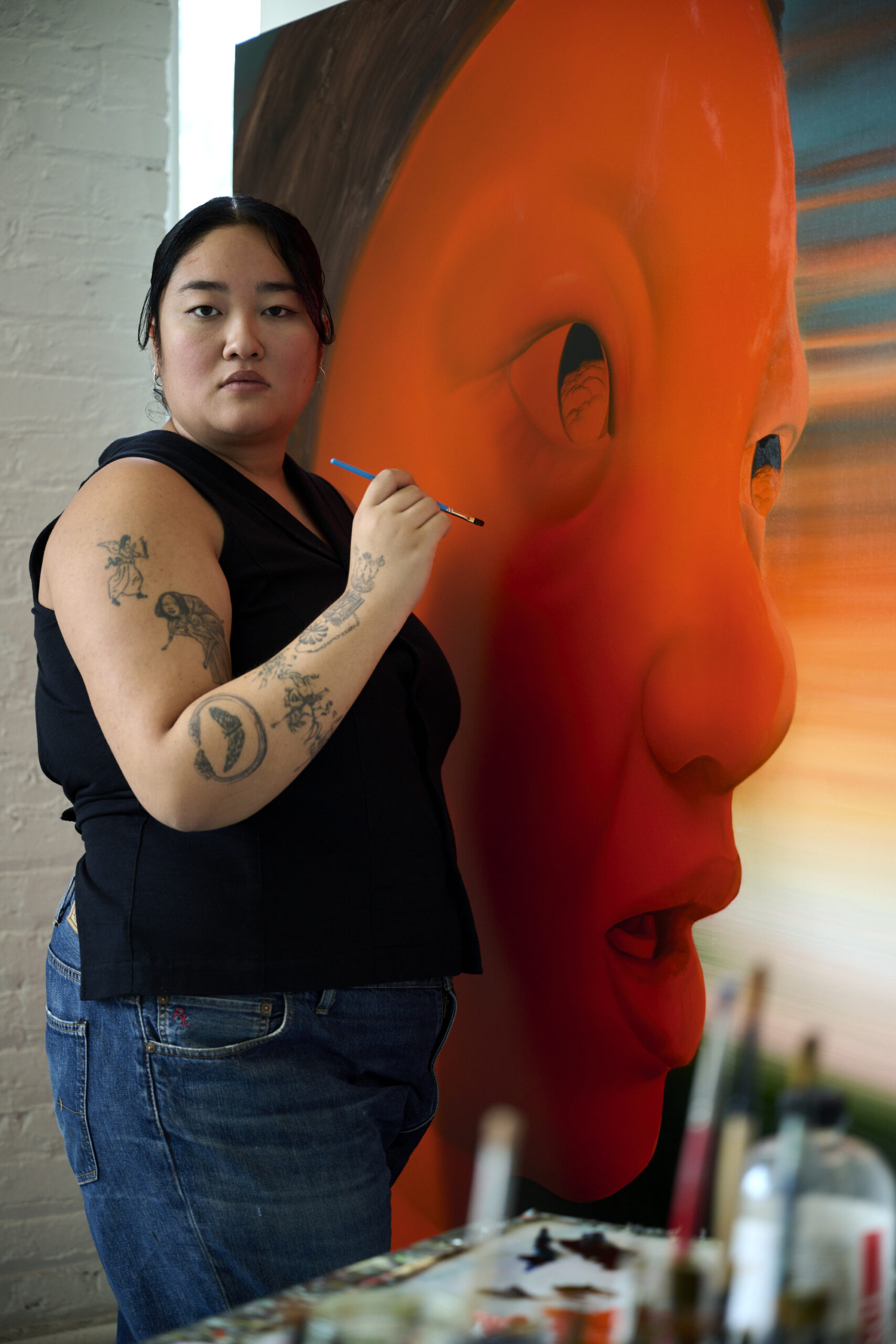
Sasha Gordon, photographed by Jason Schmidt. Courtesy Matthew Brown and David Zwirner
Last week, when Lucy Liu met the painter Sasha Gordon for the first time on Zoom, she opened with a bold declaration: “You’re just delicious.” Gordon, caught off guard, broke into a bashful giggle. Despite having been recently turboshot into art world stardom, the 27-year-old artist maintains a tumultuous relationship with her reflection, one she continues to reproduce in her saturated and warped self-portraits. Gordon often paints herself as anxious and erotic, allowing her to maintain control over her own narrative. Liu, who’s spent decades navigating the vagaries of the entertainment industry, knows the drill: to exist as an image is to risk being consumed by it. In Haze, a new solo exhibition opening at David Zwirner next week, Gordon places her alter-ego at the center of tense and unnerving plots. But each piece, nevertheless, maintains her trademark injections of humor and wit. In conversation, the two artists went deep on tokenization, death, and surviving the spotlight.—EMILY SANDSTROM
———
LUCY LIU: It looks like you’re in your studio.
SASHA GORDON: I am. I slept here.
LIU: Oh, you did? That’s amazing.
GORDON: Is it?
LIU: I have a studio too, but they come by intermittently to check to see if we’re sleeping in there because we’re not allowed to.
GORDON: Yeah, that’s what I’ve heard. I mean, I bet there’s people in my building who do that, but the maintenance guys leave at four, so it’s a free-for-all after that.
LIU: Well, it’s so wonderful to speak to you. I was surprised that you wanted to chat to me. I was so honored.
GORDON: I’m so honored to speak to you right now.
LIU: You’re incredibly talented and you’re beautiful and so sexy. Tell me about all the sexiness happening.
GORDON: [Laughs] What do you mean?!
LIU: All of it. I mean, your personality is graphically detailed onto your work itself, but I think your personality when you’re photographed really shows you’re just delicious.
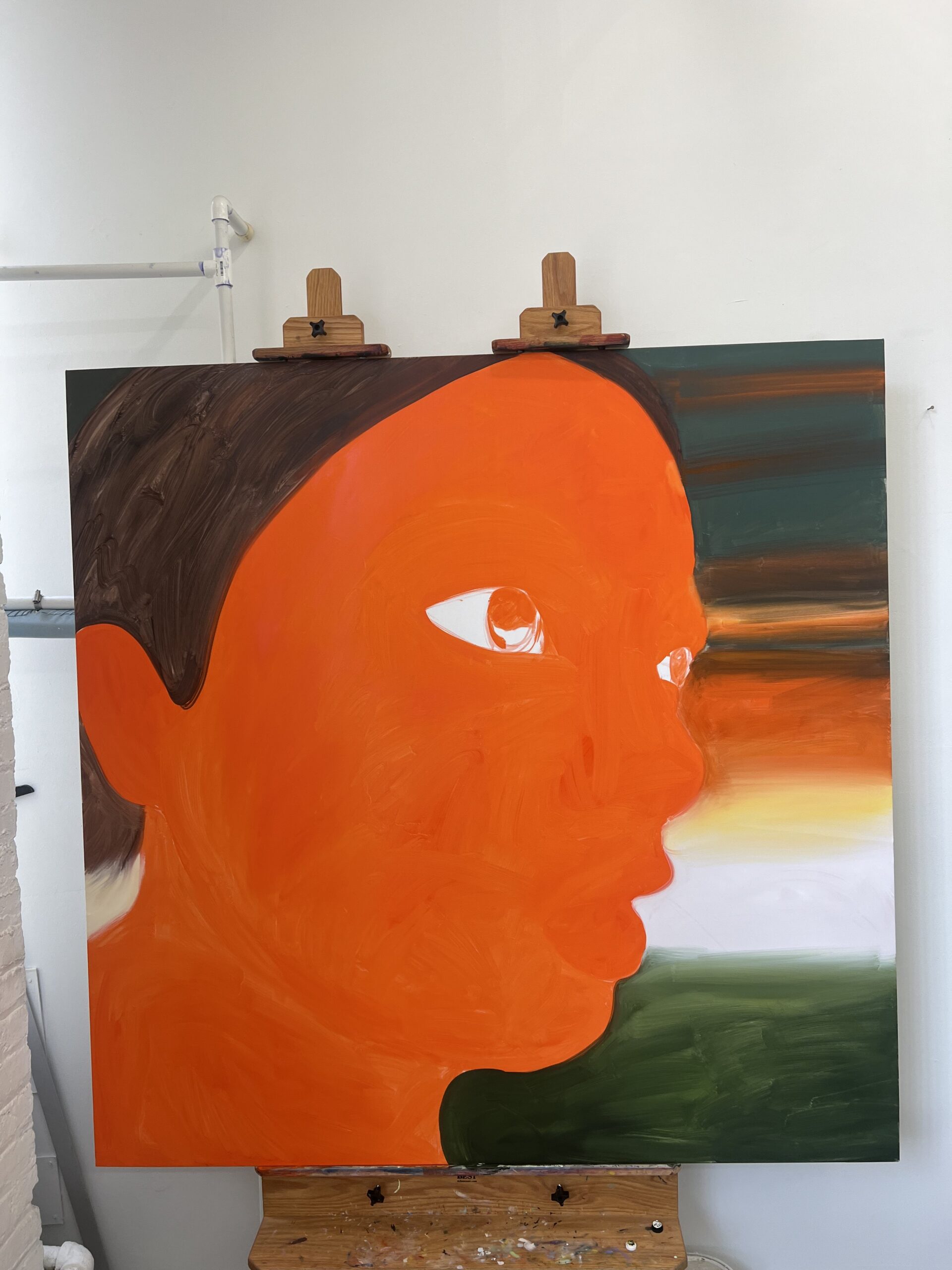
Flame Like a Bush (in progress), 2024. © Sasha Gordon. Courtesy the artist and David Zwirner, New York.
GORDON: Oh my god.
LIU: Do you see that for yourself?
GORDON: First of all, it’s so crazy that you’re saying that.
LIU: I really believe it. I don’t say things without being honest.
GORDON: Thank you so much. I mean, I always used to be scared of showing my full personality when I was younger, but I feel like as I’ve become more comfortable with myself, I’ve become this bubbly and attitudey person. I just wanted that to come through my paintings, instead of doing these very still portraits. I wanted to capture that essence I have.
LIU: Do you feel like you didn’t have the ability to talk about it or express yourself when you were younger?
GORDON: Yes. I grew up upstate and went to a very sports-centered high school. So trying to find something that I enjoyed but also could find comfort in was challenging, because the arts program wasn’t that appreciated. But my mom would take me to these art classes outside of my town and I just was so obsessed with painting.
LIU: Wow. And you felt like your mother really saw you and was able to expand what she saw that you felt?
GORDON: Yes.
LIU: That’s amazing. To see something that somebody feels is honestly a great gift.
GORDON: Yeah. My mom is the person I’m the closest to. I mean, I think the reason she put me in classes was that I was drawing in my children’s books, just little circles over and over again. I was just so obsessive, and she just thought I needed another outlet.
LIU: How old were you when you started drawing those circles?
GORDON: That was when I was a toddler, I think.
LIU: So Good Night Moon is all destroyed?
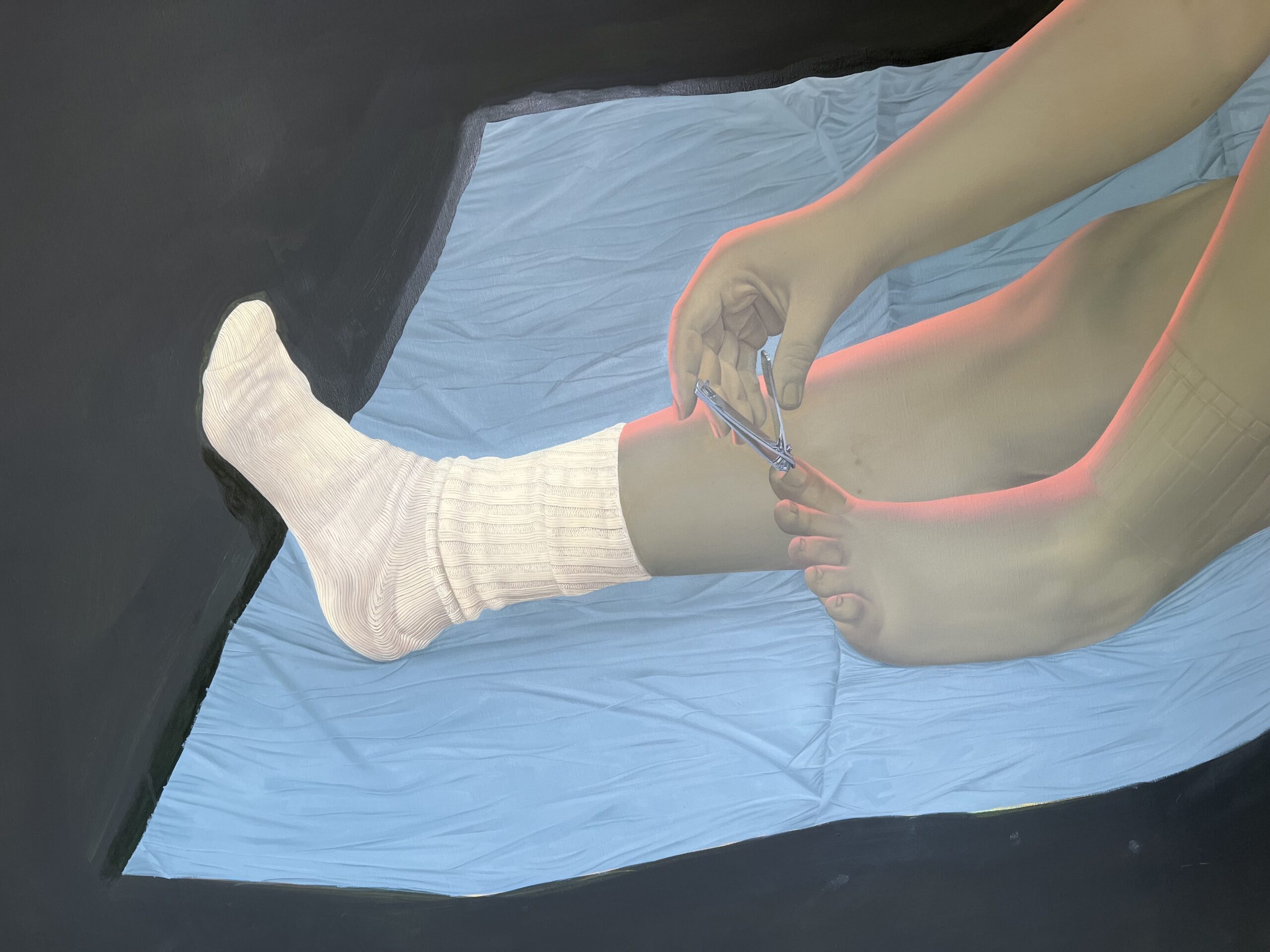
It Was Still Far Away (in progress), 2024. © Sasha Gordon. Courtesy the artist and David Zwirner, New York.
GORDON: [Laughs] Yeah, all destroyed. But yeah, she put me in classes I think in kindergarten and I started oil painting in third grade.
LIU: Wow. That’s very expansive for a third grader. I wanted to ask, do you feel scared about anything in particular in your life?
GORDON: Scared? I mean, I was scared yesterday. I was scared this morning. Paintings, even as detailed and as precious as I treat them, I’ve realized I can’t treat them like that in my brain because things are always going to change. I’m just a very anxious person, and I paint about my anxieties and ambiguity. I just never know what to expect. Nothing’s ever a solid solution or a right answer. So that keeps me on my toes for sure. Also, death also scares me.
LIU: What about death? Is it the expulsion of your corporal being? Is it the fear of losing your connections or your relationships?
GORDON: Yeah, the idea of the whole world going away and also spending so much time in a body that I’ve had such a confusing and such a tumultuous relationship with, and that it would just feel insane to leave it.
LIU: [Dog jumps on her lap]
GORDON: Oh, my god. What’s their name?
LIU: His name is Kaji. He’s a foster that we adopted. He was in a kill shelter situation. There’s a lot of pounding around me, so he’s feeling a little insecure.
GORDON: Oh, no worries.
LIU: But he understands what death is as well. He’s been very close to it.
GORDON: Oh my God. I can’t imagine.
LIU: Do you think that you explore that fear in your work? Or do you feel that it’s more like, you take it and you create this comedic or misrepresented tone in order to diagnose and to heal yourself?
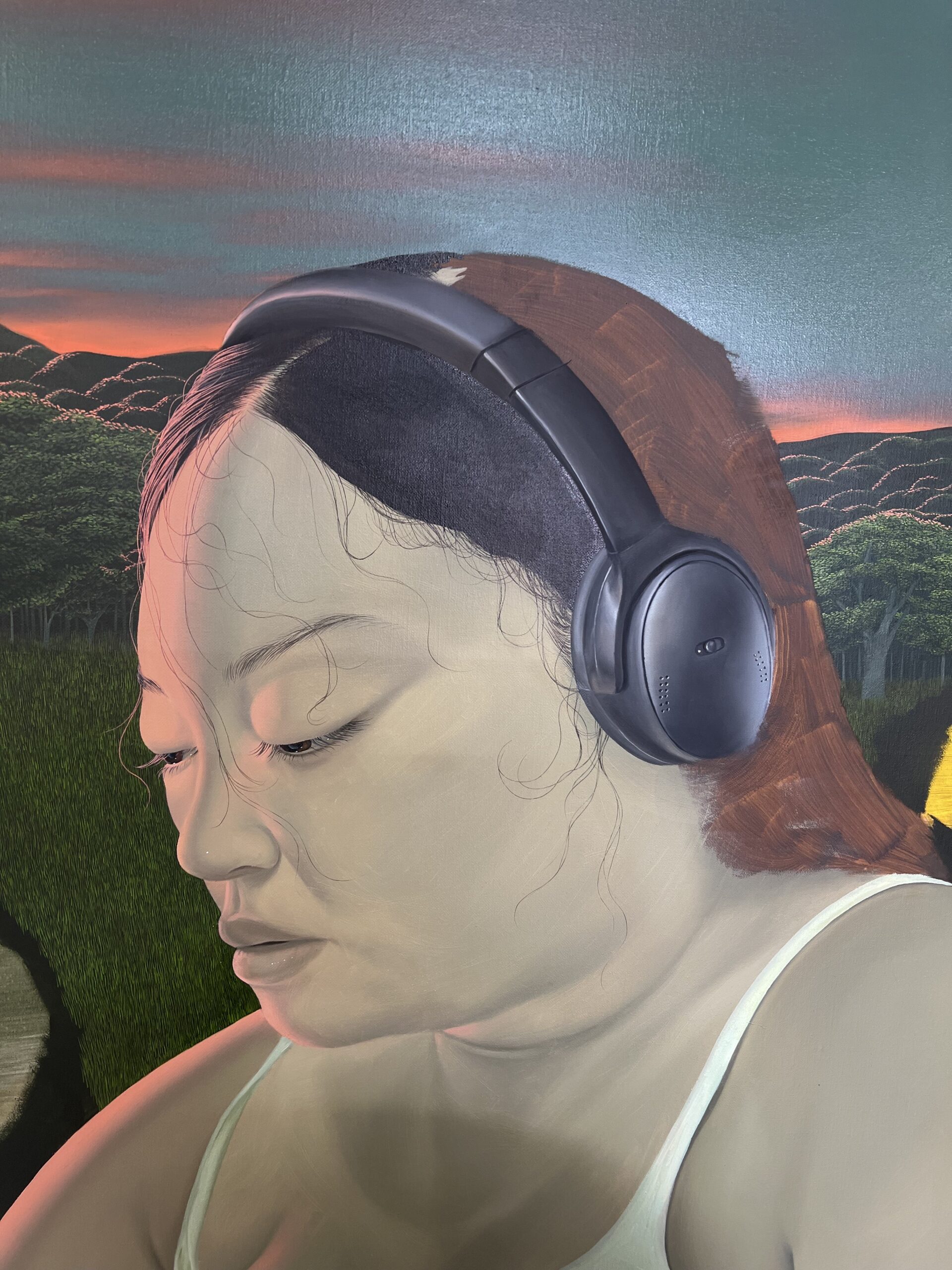
It Was Still Far Away (in progress), 2024. © Sasha Gordon. Courtesy the artist and David Zwirner, New York.
GORDON: I think it’s a bit of both. There’s definitely this feeling of impending doom or fear of what’s going to happen next, or the endless possibilities of what could happen. And this show in particular, there’s a bit more of showing the limits of how far the body can go. There’s a part where there’s this hazing process of one of the main characters in the series, so it’s sort of dealing with being on the brink of death, which I don’t think I’ve done so directly.
LIU: Do you always work in a narrative format? Or do you sort of feel like sometimes it’s a one-off and it’s okay that it doesn’t necessarily speak to the rest of the story because you’re still the center point?
GORDON: I mean, usually it’s a one-off situation. I almost get annoyed when I have to come up with a press release and theme for a show, because I just want to make stuff that comes out and I don’t want to think too hard about it. But it comes together by the end because it’s still all from my subconscious that is still all tied together. With this show, I wanted to try almost one ambiguous narrative, but I think each work can still be taken on their own. Also things can be seen out of order, even if there is a particular order in my brain, which I think is fun. There’s not really a proper ending or way of solution.
LIU: I love that. I think there’s so much courage in your work because you put so much of yourself into it. It’s interesting when you start to monetize it. How do you work on something that’s intimate and then you release it into the world and then it sells or doesn’t sell? And once it starts to sell, does it almost corrupt how you work?
GORDON: I mean, I probably think about it once a day, but I really try to not let it impact my ideas or way of painting. I actually kind of think back on when I was younger, when I didn’t have Instagram and when I wasn’t selling work. It was just such a pure form of expression for me. Now I almost feel like Instagram is what I think about more, because it’s just what I have access to every day. But for this show, I really haven’t posted that much and it’s been kind of very freeing. I’m almost more scared to show the work now, because it’s almost like being pregnant with something and then giving birth to it years later.
LIU: It’s a beautiful thing.
GORDON: I think it just doesn’t hit me until two weeks before the show, which is basically now, but it’s exciting.
LIU: I’m proud of you.
GORDON: Oh, thank you.
LIU: Really. You grew up in a time where technology is so different from when I grew up. And the accessibility to visual images and opinions can really inundate a person’s mind. Do you feel that it is something that you live and breathe, or do you think you can step away from it as a way to disconnect?
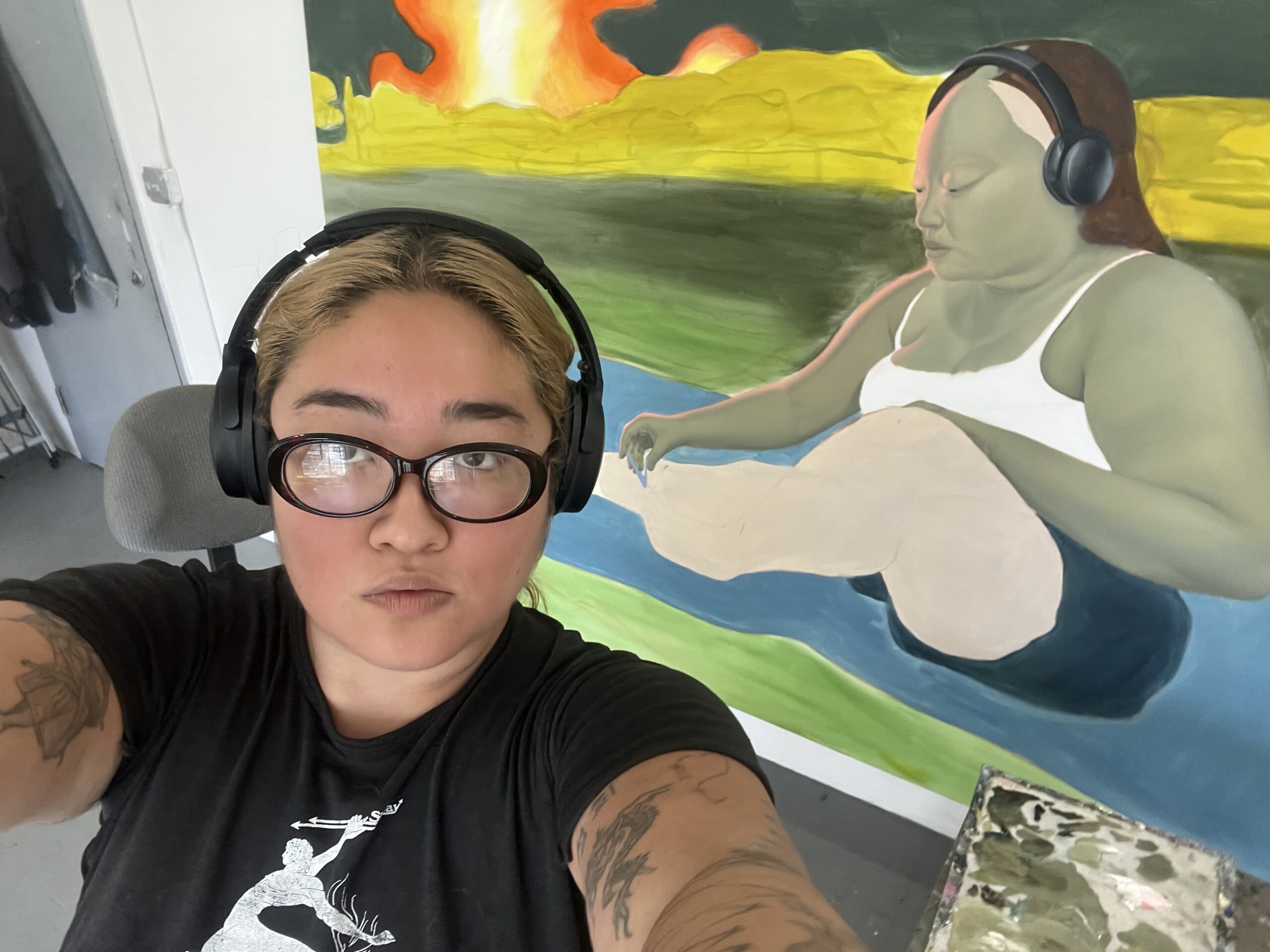
It Was Still Far Away (in progress), 2024. © Sasha Gordon. Courtesy the artist and David Zwirner, New York.
GORDON: I mean, I do have to step away every now and then. I think I’m very affected by whatever’s around me. I feel like I could join a cult, you know what I mean? So I do have to take time away, especially with visual things. I look at art a lot, but the reason it probably isn’t best for me is that I feel like it might just impact my work a little too much. Obviously everyone’s influenced by other artists, but I think I get scared I’ll look at someone’s work and subconsciously be inspired. I try not to go crazy. I’m more of a TikTok person right now.
LIU: You’re doing all the dance moves in your studio?
GORDON: Oh my god, no. I could never. I used to, but–
LIU: So cute.
GORDON: It’s just more that I need an escape from seeing people I kind of know or art world stuff. There’s been periods of my life when I was super affected by it. In college I wasn’t even Instagram famous, but there were other students who knew who I was before getting into the school, and it really freaked me out.
LIU: That’s a lot of pressure.
GORDON: Yeah. It just felt like a lot of eyes on me, which I was not used to.
LIU: How do you feel now knowing there are so many eyes on you? Do you feel more insular because of it? Or more careful about how you have to appear or present?
GORDON: I think that’s in the back of my mind. Again, I try to not think too hard about things. I think a lot of the time things happen to me and I kind of just don’t let myself fully register it, or else I think I would just spiral and go into hiding. I do have a lot of pressure, but I also like to be challenged. It is challenging me to make my work better and have it evolve, but it is scary to know that the audience is so much wider than it was before. And the bigger the audience, the more opinions. I just have to let certain things go and not read all the comments and whatnot.
LIU: At your openings, do you find it to be sort of joyous, but overwhelming? Is there closure, or do you feel like you can’t wait to get in your pajamas? 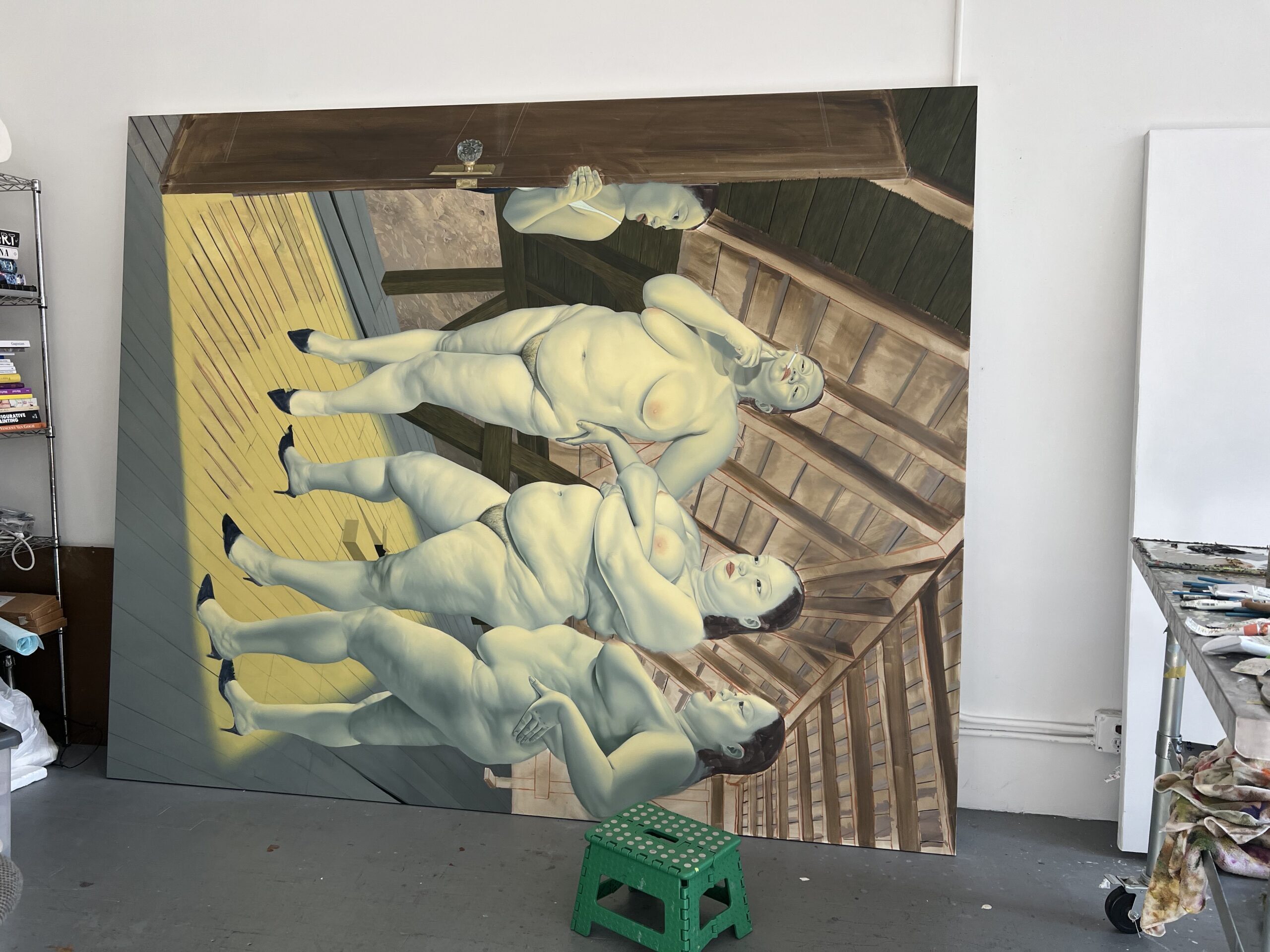
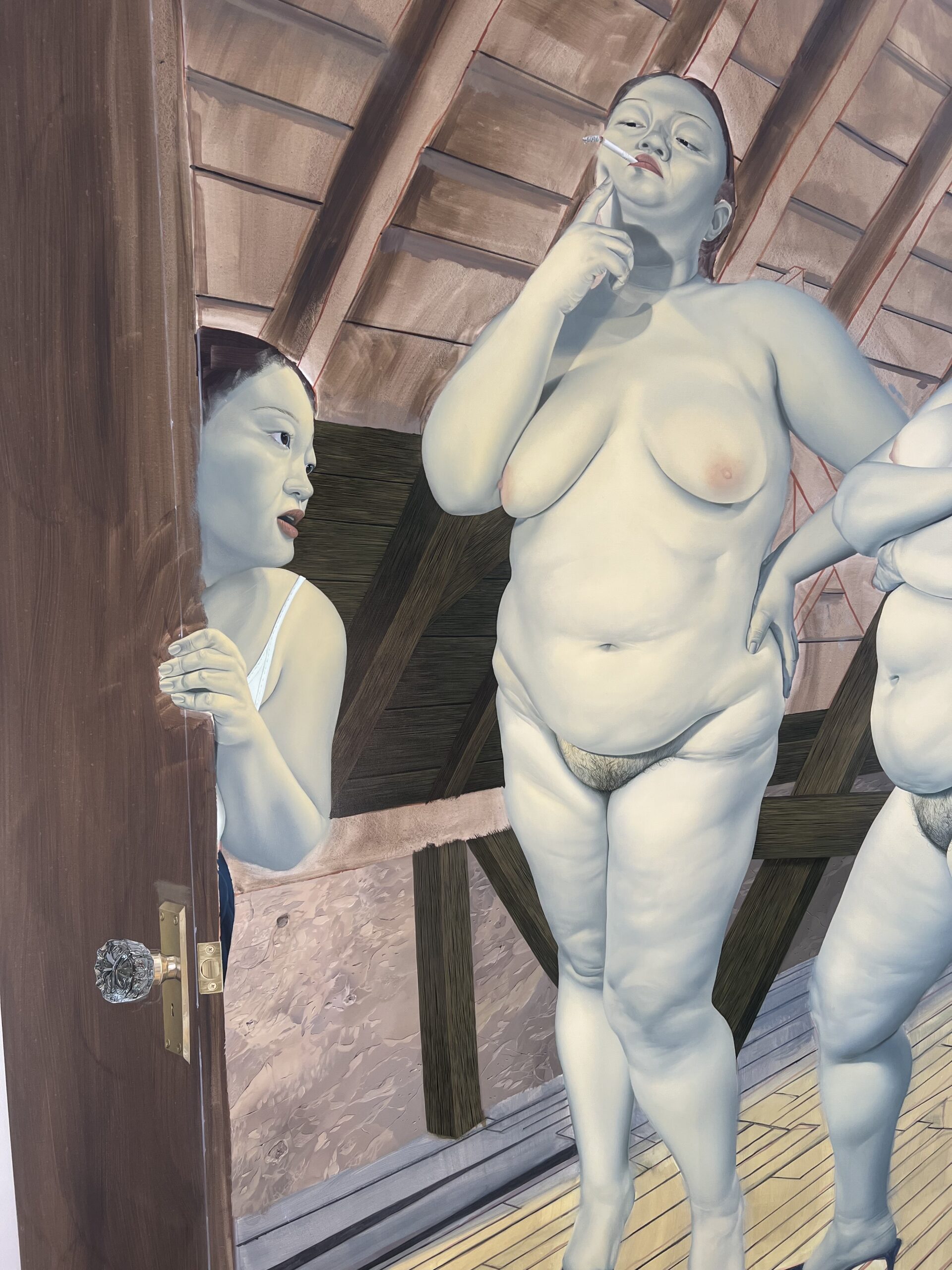
Whores in the Attic (in progress), 2024. © Sasha Gordon. Courtesy the artist and David Zwirner, New York.
GORDON: Oh my god, yeah. A bit of everything. This is definitely the hardest I’ve worked in a long time. I’ve had crazy deadlines and I’ve almost quit. Or shit will just hit the fan. But this is a very intense show, for sure. When I go to the openings, I definitely feel a bit frazzled, because I’m just like, “I can’t believe people are excited to see this.” Like in reality when I’m making the paintings I’m just chain smoking and taking naps to dissociate. It’s really funny to see people being so supportive.
LIU: I wanted to ask you, how well do you know your body when you’re painting that you don’t need to look at yourself in that position when you’re painting? How do you translate yourself visually on a canvas that’s obviously disproportionate to reality? And do you draw first?
GORDON: For drawings or smaller paintings I just kind of wing it from memory, because I’ve just done it so many times. And also just growing up and being so obsessive with how my body looks and how it’s always changing, it’s just like I know… Well, it’s funny because I know what it looks like, but I also don’t know what it actually looks like. I’ve basically been studying and analyzing my own body for years and years, but I still use photo references for the bigger paintings just because I really want the lighting to be as solidified as possible. I want them to be sculptural.
LIU: And is there honesty with the lighting?
GORDON: Yeah. I’m not following exactly what the photo is showing me, it’s just to make sure that things look voluptuous and rounded. I want things to feel set where they really are in the setting of the painting. That’s kind of what grounds the paintings for me, just how heavy and smooth the figures look. But I have tattoos on my arms and stuff, and sometimes it’s hard to paint like a crease on my arm because there’s a tattoo there. But it’s funny, I’m only 27 but I can already tell things are changing and it’s cool to document it. I’m interested to see what it’ll look like as I age.
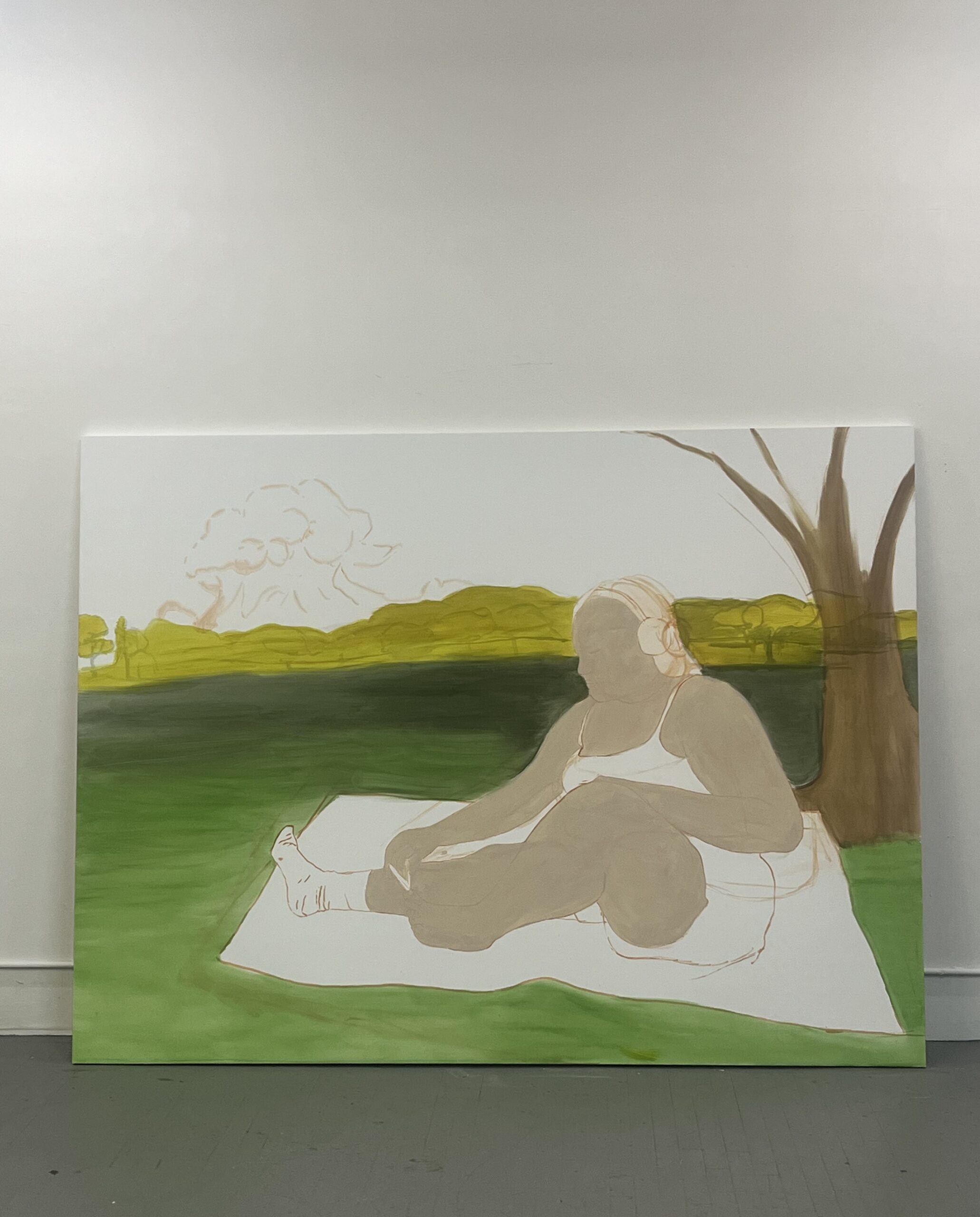
It Was Still Far Away (in progress), 2024. © Sasha Gordon. Courtesy the artist and David Zwirner, New York.
LIU: Who you are now at 27, when I look at your work, I see you. That woman looking at me with confidence, with absolution in her body, feeling herself, feeling her feet, being embodied in your own body essentially… It’s unapologetic. Is that something you were discovering at a young age, and did you paint yourself to feel more empowered in your body?
GORDON: Absolutely. I entered college and thought, “Okay, I can paint really realistically.” And then a bunch of professors were just like, “You’re not really painting about anything.” I mean, I think some people’s art who paint about nothing is amazing. But it just wasn’t me, and they could tell. So I really forced myself to think of what I wanted the work to be about and look like. At that time, I was still really insecure because I had just come from my hometown, which was not horrible, it’s just that it was really not diverse. I just didn’t connect really with anyone besides a few, and I had a lot of resentment toward my peers in school. I think being mixed–because my dad’s white and my mom’s Korean, I think my mom said I was white on the census or something. And I was like, “Wait, what?! So I guess I’m white now?”
LIU: Check! Caucasian.
GORDON: Yeah. I was just very, very disoriented and resentful because everyone seemed so comfortable and everyone was from a similar background. I only knew of my mom and truly just you and Charlie’s Angels and Kill Bill. I was really alone. But once I got to RISD, I was way more comfortable exploring my identity and my queerness. And I think that was a very important part of my practice. But now as I’m out of school and I’m in New York, I’m way more comfortable and I have my groundings. It’s also made me realize I want to explore other things in painting. Especially because there are these periods where they were kind of grouping Asian artists together, and also Black artists together, and it felt very tokenizing. But I want my work to look like me because I want to see that more. But it’s just because I exist. It’s not like I just want to paint Asian women, it’s just who I am. Although it’s kind of transformed. It’s more about ambiguity and I think a lot of the psychological effects of my developing years growing up.
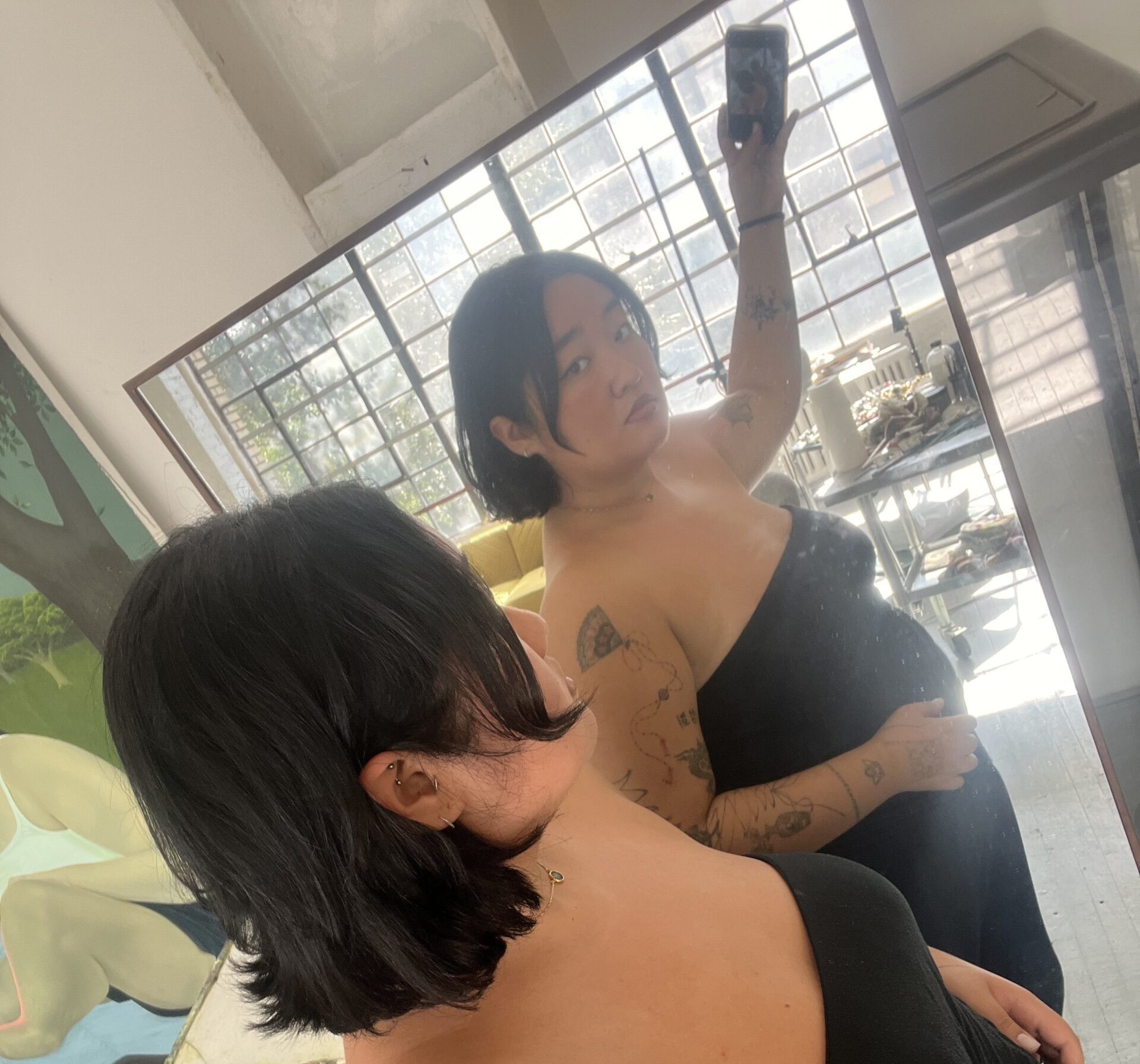
Courtesy of the artist and David Zwirner, New York.
LIU: That makes sense. A lot of times I get, “Oh, you play such confident characters and these badass action heroes,” but obviously there’s so much more to what’s on the screen. It’s like, whatever we’re doing and however we’re doing it, it becomes tokenized because that’s what they see. It’s funny because when they reached out and asked if I wanted to do this interview, I assumed they paired us together because we’re both Asian. You know what I’m saying? But actually it sounds like you actually did want to speak with me. But was it you or was it some other person?
GORDON: No, it was me.
LIU: Oh, I was really curious and I’m so happy and relieved to hear that.
GORDON: No, no, no. I’m a huge fan. And it’s very surreal to be talking to you.
LIU: I would love to come and see your studio. We can do that offline.
GORDON: Yes, for sure.

